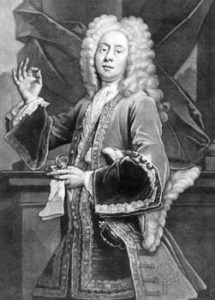By [ANON1]

Colley Cibber as Lord Foppington in The Relapse by John Vanbrugh. Wikimedia. Accessed 12/03/18.
Colley Cibber (1671 – 1757)
Colley Cibber played the role of Lorenzo in Agnes de Castro in 1696.
Cibber was a bit of a Jim Carrey of his time, portraying the line of ‘the fop’. The fop is an affected character, who puts on airs and graces, or acts in a way that conveys that they are very much putting on a role. However, Cibber went further than just acting: he was a famous writer and theatre manager, most prominently at Dury Lane Theatre, until 1734.
Whilst his role in this play was small, Cibber’s performance as the fop continued to improve his reputation throughout this era, with a highlight of his career, playing sir Fopling Flutter in Etherege’s The Man of Mode.[1]
PERSONAL LIFE
Cibber was born in London on the 6th November 1671 to his parents, Caius Cibber, who was a Danish sculptor, and Jane Colley, a lady from an upper class family. Cibber went to The King’s School in Grantham until he was 16, but he did not take his education any further.
Cibber married Katherine Shore in 1693 and had twelve children, of which only six lived passed infancy, but he was always considered by others to be a family man, despite their criticisms of him. McGirr even goes so far as to argue ‘that Cibber’s life-long commitment to both his biological and theatrical family shows an engaged and committed family man, not the selfish egotist we have been taught to expect.’[2]
HOW CIBBER BECAME A STAR
Having started his acting career in 1690, Cibber found himself put into roles that did little towards building him a strong reputation in the theatre world. When he was married three years later, he realised his earnings would not suffice.
So, he did a bit of a Joey Tribbiani and wrote the play, Love’s Last Shift in 1693, so that he could give himself the role in which he truly desired (Friends episode 10, series 5 – Joey writes a film script so that he can star in it). Cibber dreamed of playing the ‘hero’ in plays, but found that his acting style was far more attuned to being the fop. Therefore, when Sir John Vanburgh gave his play a sequel in 1696, he changed the name of Cibber’s role, Sir Novelty Fashion, to Lord Foppington and it was through this, that Cibber gained his reputation as the fop.
Cibber continued to act in many plays throughout his career, the most successful being, Sir Fopling Flutter in Etheredge’s The Man Of Mode, Sir Courtly Nice in Crowne’s Sir Courtley Nice and Richard III.
Cibber’s success was, however, mostly achieved through his writing and theatre management. In 1710 Cibber was part of a famous triumvirate of actor-managers under which Drury Lane Theatre thrived. At the height of his career, despite the fact that many felt it was undeserved, Cibber scandalously beat out Alexander Pope to receive the title of Poet Laureate in 1730 (a huge honour). Pope reacted with his Dunciad, where he states that Cibber is the ‘Angel of Dulness, sent to scatter round Her magic charms o’er all unclassic ground’.[3]
CIBBER IN AGNES DE CASTRO
Whilst Cibber is not the star of the show in Agnes de Castro, he stays true to his line of ‘the fop’ and although he might not be a protagonist, without Lorenzo, the plot of Agnes would not have turned out in the same way.
Cibber’s foppish nature is clear from Act IV Scene 1 when he is trying to stop Agnes from escaping from his imprisonment of her. Instead of treating her with any disrespect, he puts on airs and graces, calling her ‘madam’ at the beginning of each of his lines. His lines are also quite lyrical, which suggests the pompous attitude that is expected of ‘the fop’.
Lorenzo also enacts the idea of the fop’s tendency to be quite pompously stupid. Due to the dramatic irony in the play, when Agnes is trying to convince Lorenzo of her innocence, Lorenzo’s exaggerated polite manner allows him to seem less than clever. He states:
Elvira, and Bianca, have declar’d.
Before the King, they saw you kill the Princess.
and
Madam, be careful: What probably cou’d be Elvira’s Motive,
To kill the Princess?
and
Yet she protests against you;
Elvira has a Wound too, which confirms her Accusation.
This slow realisation of facts, generates an irritated attitude in the audience towards Lorenzo, allowing his character to take on even more of the fop’s role as the target of disdain.
[1] Etherege, George. ‘The Man of Mode’ in Restoration and Eighteenth Century Comedy (New York: Norton, 1996)
[2] McGirr, Elaine M. Partial Histories: A Reappraisal of Colley Cibber. (London: Macmillan, 2016) p. 19.
[3] Pope, Alexander. Ed. James Sutherland. The Dunciad. (London: Methuen, 1943) p. 333.
